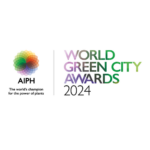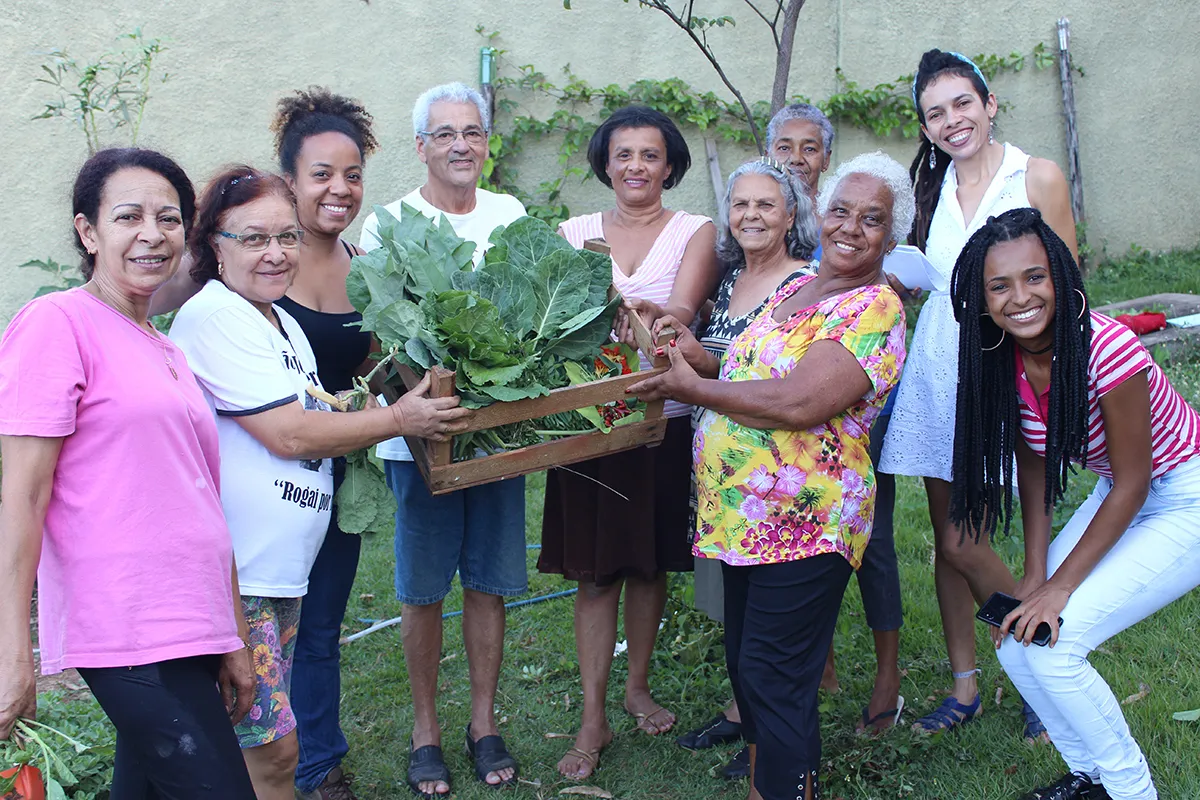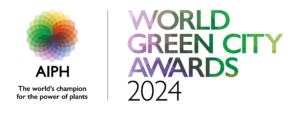Benefits of Urban Greening
Harnessing the Power of Plants
The Policy aims to promote local agriculture and sustainable and healthy food systems within the city, through the implementation of ecological solutions. This is ensured by the public administration’s support of Community Collective Production Units that run agroecological production systems or are in agroecological transition. That is, the Units must use techniques that optimise the use of available natural and socio-economic resources and respect the socio-cultural, territorial and environmental integrity of the site. Or be in the process of gradually changing the practices and management of industrial and conventional agriculture, by transforming the productive and socio-environmental bases, land use and natural resources, promoting agricultural systems that incorporate agroecological principles and technologies.
The project is implemented in partnership with the Federal University of Minas Gerais (UFMG)’s Urban Agriculture Study Group, and the Group’s research results are applied to the Policy, which is constantly renewed and updated.
Delivering Multiple Benefits
As mentioned before, this initiative has its own institutional architecture within the city’s organisation chart with resources provided for in the municipal public budget. This is ensured by the Municipal Ordinary Law No. 10.255, established in September 2011. The Law institutes, among other things, that the Urban Agriculture and Agroecology Support Policy is an integral part of the Municipal Food Supply Policy, in harmony with urban policy and aimed at the food and nutritional security of the population, on a sustainable basis.
One of the main objectives of the Law is to encourage cultivation, forest management, breeding and processing practices based on agroecological agriculture aiming to prevent, combat and control pollution and erosion in any of its forms, protecting flora, fauna and the natural landscape.
The City’s Bold and Innovative Vision
Overall, the initiative can be considered innovative because it is a systemic and inclusive policy that combines complementary and supplementary actions aimed at ensuring access to food security and to several points of the circular economy, such as production, supply and access to healthy food.
It is an integral part of the Municipal Food Supply Policy, and, because of that, one of its main objectives is to improve access to food and increase food availability for own consumption and local trade. The initiative also promotes sustainability due to its focus on nature and the local ecosystem, biome and wildlife.
Partnerships and Collaboration
The initiative is implemented and coordinated by the City Hall, through its Undersecretariat for Food and Nutritional Security. There is an executive council, the Intersectoral Council for Food and Nutritional Security – CAISAN, composed by high-level decision-makers of the City Hall, which coordinates intersectoral actions on food and nutritional security. For other bilateral and conjoint initiatives, other municipal secretariats that work outside the environmental axis are involved, such as the Municipal Secretariat for Urban Policy, the Municipal Secretariat for Social Assistance, Food Security and Citizenship, the Municipal Secretariat for Economic Development, the Municipal Secretariat for Education, the Municipal Secretariat for Health, and, lastly, the Deliberative Council for the Municipality’s Cultural Heritage.
Outside the City Hall, the Policy strengthens community participation, involving the local population, civil society organisations, schools and other institutions. Farmers’ networks, thematic fairs and events, and environmental training and education programs are encouraged, as well as affirmative actions to support new farmers.
Addressing Urban Challenges
The Issue
Food Security is not a specific issue to local governments, it is a global issue which affects most urban environments especially those farther away from rural areas and agricultural production zones. Access to affordable and healthy food is also one of the trending problems of the present and of the foreseeable future, not only in terms of hunger, but also whenever climate change is considered. The industrialised production of food has considerable impacts on pricing, health and environmental pressure. Also, the bottlenecks of the food supply chains pose threats to the urban environments when it comes to food supply and distribution. The solution of fostering urban agriculture, which focuses on agroforestry and family farming as a means of production, is an important strategy to mitigate these issues.
The Impact of the Issue
Food security is a global issue. Food inaccessibility, hunger and the environmental impact of industrial food production are grave worldwide concerns. The lack of options and alternatives to food production and supply may worsen scenarios of hunger, malnutrition, environmental impacts of the traditional industry, increase of inequalities and vulnerabilities, loss of right to the city, gender imbalances, social exclusion and several other social-economic impacts. Belo Horizonte has been acting towards their mitigation since 1993. The Policy, implemented since then, is responsible for a very significant social and ecological impact, especially due to its focus on food and nutritional security.
A Nature Orientated Future
Agroforestry is an innovative technology in itself when it comes to food production. Bringing it into urban food production maximises the effectiveness of a food security policy, due to the increase of food production and its impact on the income of socially vulnerable families. Since these families don’t need to buy fruits and vegetables, because they are produced at home, their income can be directed towards other forms of consumption, and their nutrition is healthier. They are also able to turn this production into additional income. All agroforestry units in Belo Horizonte are currently exclusive plant-based productions, so this increases the use of plants towards the construction of a better future for the city.
Nature Positive Solutions
Implementation
The Policy is implemented through the City Hall’s Undersecretariat for Food and Nutritional Security, and it has its own institutional architecture within the city’s organisation chart with resources provided for in the municipal public budget. Between 2016 and 2020, the budget destined for the initiative grew from BRL 60,06 million to BRL 82,6 million. In 2019, the city had 41 Community Collective Production Units, and, as of today, that number has grown to 56 Units. Besides that, there are over 250 Institutional Production Units, that operate within public facilities such as schools, health centres, etc., whereas in 2019 there were around 127 Units. Belo Horizonte has 113 produce fairs, where the produce from agroforestry units can be sold to the general public. Part of it is also bought by the City Hall to be distributed to the public school in order to provide meals to students. As of 2019, around 280 hundred kilograms of food were purchased with this objective.
Feasibility
Urban Agriculture and Agroecology Support Policy is provided for by law and has its own decree within the Municipal Administration. The policy has its own specialised team that works on its implementation and renewal. Because of this, the initiative has its own budget, which is planned and updated annually by the City Hall.
Multi-Stakeholder Support
The initiative is implemented and coordinated by the City Hall, through its Undersecretariat for Food and Nutritional Security, in collaboration with other Municipal Secretariats that work in and outside the sustainability axis. Besides the ones already mentioned above, the Municipal Secretariat of Construction and Infrastructure, the Urban Cleaning Superintendence, Municipal Secretariat of Environment and the Municipal Parks and Zoonosis Foundation are other important collaborators of the Policy. Alongside them, the Municipal Councils of Food and Nutritional Security, School Feeding and Environment are involved in the initiative
The Horizontes Agroecológicos Association is a NGO, made up of agriculture workers, that plays an important role in the Policy, representing the civil society and their demands.
Management and Maintenance
The initiative is planned and implemented keeping in mind its long term effectiveness and feasibility. That begins with the selection of the areas that are destined for agroforestry production. Most of them are picked out by the City Hall as environmentally degraded areas, which then become public interest areas. The soil is examined and treated, and the areas are then allotted and distributed to the vulnerable population that show interest in the agroecological production. In order to be allocated one of the Units, one must meet some criteria. That does not include previous knowledge of food production, because the City Hall is responsible for providing assistance and consulting on soil treatment and planting, as well as distributing basic inputs for initial production. After the allocation, much of the monitoring of the proper use of the land and of the food production is done by the community of residents of the Units themselves. The main challenges are the lack of technical knowledge necessary to properly use the space and the abandonment of the plot of land, which however are usually overcome by the measurements aforementioned. Another barrier is the lack of basic infrastructure in the allotted areas, but this is being dealt with by the City Hall by providing fencing, energy, drinkable water, etc., in the newly distributed Units.
Measuring and Reporting Impact
Monitoring Results
The monitoring measures of the Policy are put in place by a dedicated team that works in the Undersecretariat for Food and Nutritional Security. This team is made up of technically equipped and capacitated personnel oriented, on one hand, by a robust food and nutritional security municipal policy guided by what is established by national rules and recommendations. On the other hand, as new debates and information are produced in international circles about environmental intervention and sustainability, such as Sustainable Development Goals (SDGs) and the New Urban Agenda, this is brought into the Policy, so it is constantly updated and effectively put in place.
Demonstrating Progress
As the implementation of the Policy advances, and results and new experiences are monitored and shown, new information is produced and applied to update the initiative. Therefore, the Policy’s own results are responsible for structuring the decision-making process of its implementation.
Measuring Impact
In terms of quantitative results, as of today, there are 56 Community Collective Production Units, with about 400 farmers and a cultivation area of 102,000 m², and over 250 Institutional Production Units. The production that stems from the Units benefits the families that work in these areas, because it grants them healthy food options without cost. Since these families have the option of selling their produce on municipal fairs, the Policy also serves to grant vulnerable people a new source of income through the democratisation of urban agriculture.
Learning and Transferability
Adaption and Enhancement
In response to the challenges identified by policy monitoring, the aim was to: (1) reduce bureaucracy for farmers through the creation of simpler and more accessible digital tools; (2) change the priority criteria for implementing the policy, such as expanding communication between public authorities and farmers; (3) conceptual qualification of the policy, which now has a more comprehensive view of production in urban space, transforming productive units from mere vegetable gardens to spaces that include different types of production, such as animal husbandry and agroforestry; and (4) shortening the production cycle with the creation of marketing channels and spaces (urban agriculture fair) that place producers and consumers in direct contact, without the need for intermediaries.
Furthermore, agroecology has become one of the central principles for thinking about and implementing urban food policy. Therefore, the City Hall only supports those producers who do not use fertilisers in their products.
As for the stakeholders’ contribution, the Urban Agriculture Study Group (AUE) at the Federal University of Minas Gerais assists in structuring and managing data and mobilising farmers. In turn, the Technical Assistance and Rural Extension Company (EMATER) provides technical assistance to farmers. The Group of Studies, Research and Practices in Food Environment and Health (GEPPAAS) provides the mapping of food environments, helping to identify food deserts and swamps, which guides municipal actions to improve food supply in these areas.
Potential for Replication
Belo Horizonte’s administration has worked to expand incentives for the production, training, consumption and marketing of food in the city, carried out by Agroforestry. This has been done mainly through official decrees.
The most recent was Municipal Decree No. 18.385, which institutionalised the encouragement and expansion of agroecological production initiatives, and the dissemination of agroecology in Belo Horizonte in dialogue with initiatives to promote family farming and support for organic solid waste management through domestic, community and institutional composting.
The decree also broadened the bases for marketing, reducing prices and promoting closer ties between producers and consumers. As well as contributing to the fulfilment of the social functions of the city and urban property, using unbuilt, underused or unused public areas for agroecological production, and encouraging partnerships on private properties.
Inspiring Other Cities
Belo Horizonte’s Urban Agriculture and Agroecology Support Policy is internationally known, and it has been recognised with several international awards and special mentions. Currently, the City is part of important international food and nutritional organisations, such as the Milan Urban Food Policy Pact, and climate change and sustainability organisations, such as the Local Governments for Sustainability – ICLEI. Belo Horizonte has also been working with bilateral partnerships, having secured important cooperation agreements on food security with foreign cities. Moreover, the city is becoming a special target to other cities worldwide who often send representatives to Belo Horizonte to find out more about the city’s food and nutritional security policy. Considering the policy’s potential for practical adaptability, the initiative is replicable in other locations, as long as there is interest from the local government, capacity to promote agroecology, and good communication and interaction between the government and the target audience.
Resilience
Reducing Negative Impacts and Ensuring Sustainability
The establishment of Community Collective Production Units requires the analysis of distinct environmental factors, as foreseen by the Municipal Ordinary Law that implanted the Policy. The terrain feasibility of the area where the Units are located is studied, through the analysis of its colour, vegetation, slope, drainage and visual analysis of compaction, texture, etc..
The long term sustainability of the Policy, through an environmental lens, is observed in the following objectives:
- Encourage cultivation, forest management, breeding and processing practices that prevent, combat and control pollution and erosion in any of its forms; protect flora, fauna and the natural landscape and have agro-ecological agriculture as a reference;
- Encourage practices that avoid, minimise, reuse, recycle, treat and properly dispose of waste that is polluting and harmful to the environment, human health and public welfare.
Environmental Considerations
For an Urban Agroforest to exist legally in Belo Horizonte, it must comply with the principles of agroecology. These principles ensure that the techniques adopted in the production must optimise the use of available natural and socio-economic resources and respect the socio-cultural, territorial and environmental integrity of the communities. Thus, the establishment of agroforestries must respect the region’s natural biome, the Cerrado, in harmony with food production.
Use of Natural Resources
Urban Agroforestry producers have access to native Cerrado seed banks for planting, as well as crushed pruning for soil cover and organic compost for fertilisation. Pest control is done primarily through the use of ladybugs, which are bred and distributed free of charge by the municipality to urban producers.





















